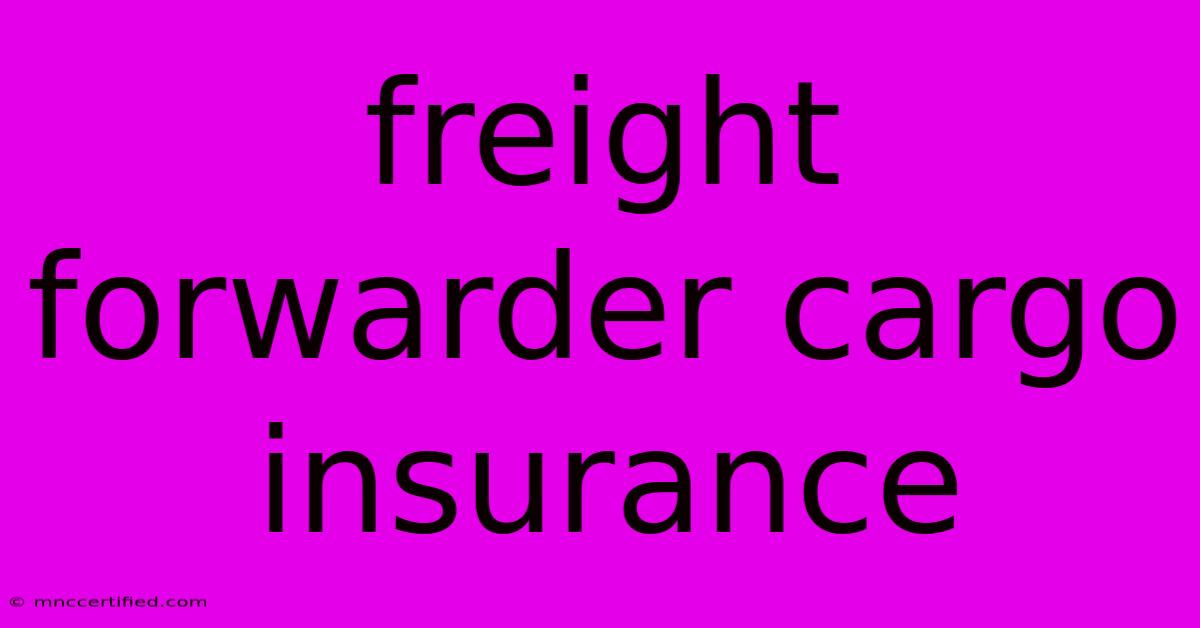Freight Forwarder Cargo Insurance

Table of Contents
Freight Forwarder Cargo Insurance: Protecting Your Goods During Transit
Shipping goods internationally can be complex, involving multiple parties and numerous transit points. Protecting your valuable cargo throughout this journey is paramount, and that's where freight forwarder cargo insurance comes in. This comprehensive guide will delve into the intricacies of this crucial insurance, helping you understand its importance, types, and how to choose the right coverage for your needs.
Understanding the Role of Freight Forwarders and Cargo Insurance
Freight forwarders act as intermediaries, managing the logistics of shipping goods on behalf of importers and exporters. They handle tasks like documentation, customs clearance, and arranging transportation. However, freight forwarders are not inherently responsible for cargo loss or damage during transit. That's where cargo insurance steps in. Cargo insurance protects your shipment against various risks, including:
- Loss or damage: This covers physical damage, theft, pilferage, and total loss of goods.
- Delay: Covers financial losses incurred due to shipment delays beyond a specified timeframe.
- Liability: Protects against claims from third parties for damage caused by your shipment.
While some freight forwarders offer insurance options, it's crucial to understand that they are typically acting as brokers, selling policies underwritten by insurance companies. This means the insurance policy is separate from the freight forwarding agreement.
Types of Freight Forwarder Cargo Insurance
Several types of cargo insurance cater to different risk tolerances and shipment values:
1. Institute Cargo Clauses (ICC):
These are standardized clauses used globally, defining the extent of coverage. The most common include:
- ICC A (All Risks): Provides the broadest coverage, including almost all perils except those specifically excluded (e.g., inherent vice, willful misconduct). This is the most comprehensive and expensive option.
- ICC B (Named Perils): Covers a specific list of named perils, such as fire, stranding, collision, and more. It's less comprehensive and less expensive than ICC A.
- ICC C (Basic Coverage): Provides the most limited coverage, primarily protecting against major accidents during transit, like sinking or derailment. This is the least expensive option.
2. Other Cargo Insurance Options:
Beyond ICC clauses, you might encounter other types of specialized cargo insurance, depending on the nature of your shipment:
- Open Cargo Policy: Suitable for businesses with frequent shipments, providing blanket coverage for multiple shipments within a specific period.
- Specific Cargo Policy: Covers a single shipment, offering tailored protection based on the goods' value and transit details.
- All-Risk Cargo Insurance: Similar to ICC A, offering comprehensive protection against a wide array of risks.
Choosing the Right Cargo Insurance for Your Needs
Selecting the appropriate insurance coverage depends on several factors:
- Value of the goods: Higher-value shipments demand more comprehensive coverage.
- Type of goods: Perishable goods may require special insurance to account for spoilage.
- Mode of transport: Different transport methods (sea, air, land) present varying risks.
- Route: Higher-risk routes may necessitate enhanced coverage.
- Inherent risks: Certain goods are inherently more susceptible to damage than others.
It's highly recommended to consult with an insurance broker or specialist to assess your specific needs and determine the best coverage. Don't underestimate the potential financial consequences of insufficient insurance.
The Importance of Clear Communication with Your Freight Forwarder
Maintain open communication with your freight forwarder regarding insurance. Ensure you understand the terms and conditions of any policy they offer or arrange. Verify the coverage specifics, including exclusions and claim procedures. Obtain a copy of the insurance certificate as proof of coverage.
Claim Process for Freight Forwarder Cargo Insurance
In the unfortunate event of a loss or damage, follow these steps:
- Notify your freight forwarder and insurer immediately.
- Document the damage thoroughly, including photos, videos, and any relevant documentation.
- File a claim with the insurer, providing all necessary supporting evidence.
- Cooperate with the insurer's investigation.
By understanding the intricacies of freight forwarder cargo insurance, you can safeguard your valuable goods during international transit and mitigate potential financial losses. Remember, proactive planning and clear communication are key to ensuring your shipment's safe arrival. Don't hesitate to seek professional advice to tailor your insurance to your specific needs and risks.

Thank you for visiting our website wich cover about Freight Forwarder Cargo Insurance. We hope the information provided has been useful to you. Feel free to contact us if you have any questions or need further assistance. See you next time and dont miss to bookmark.
Featured Posts
-
Daikin Park New Name For Minute Maid Park
Nov 19, 2024
-
Kansas City Chiefs Gift Guide
Nov 19, 2024
-
Zampa Stoinis Seal Clean Sweep
Nov 19, 2024
-
Putin Silent On Ukraine Missile Incident
Nov 19, 2024
-
Broncos Offense Nix And Paytons Synergy
Nov 19, 2024